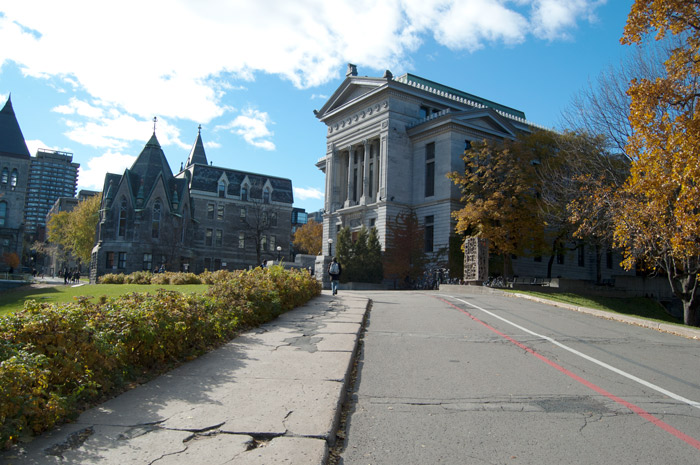While it is important to remember that hindsight is 20/20 and people who don’t dwell on the past are happier overall, fourth-year students’ reflections of their undergraduate experiences highlight some valuable information for current students.
Overwhelmingly, students in their last semester stressed the importance of taking advantage of the resources available at McGill. They highlighted how their approach over the past four years has changed in terms of meeting with professors, seeking peer help, and attending advising.
“What I never took advantage of was going to see [the professors],” Daniel Chetner, U3 Economics, said. “I think there’s a lot to be said [for that], especially in a larger class. If you make that effort to go and see them, it might be the difference between you getting a couple more questions right on the final, or you really understanding a concept. It takes 20 minutes. If you’re stuck on something, don’t just blow by it.”
Chetner’s advice is especially important for third and fourth-year students who are considering graduate school in the future. Academic reference letters for graduate school, and some jobs as well, are an important part of the application process. Developing genuine relationships with professors is pertinent to ensuring that the letters are personalized and serve as a strong element of the application. While some professors may seem intimidating in class, it is worth overcoming the anxiety to go and talk to them. They are usually happy to help and appreciate students’ interest in their research.
Taking advantage of the surrounding network of peers is also important. Josh Schulman, U3 Finance, explained how students should be skeptical of the stereotypes attributed to different faculties.
“Even though there’s a stigma that [in Management] we’re all sharks and really bad people, when you actually break down the facade, most people are a lot nicer than they seem,” Schulman said. “If you can get past the hurdle of asking for help, most people are willing to give it.”
The advantages of asking fellow peers for help and studying in groups are twofold. Discussing course material instead of just reading it makes it easier to determine whether or not one actually knows the material. It is also beneficial in terms of easing exam season blues, as studying with others is less isolating and breaks the monotony of studying by oneself.
For Tori Sung, U3 Economics, picking the right courses was a struggle at the beginning of her university career. She noted, however, that McGill’s academic resources are valuable tools that can ease difficult decisions.
“Go to advising,” Sung said. “When I was in first year I thought I had time and I didn’t see my advisor. I think it would have taken a lot of pressure off of picking courses later and then feeling like I constantly didn’t know if I was doing the right thing [….] Whether it’s networking or physical resources, you should use [McGill’s services]. I finally gained a respect for that in my last year.”
As students know all too well, going to see an advisor can be quite the hassle, especially if it is during the first couple weeks of each semester; however, being proactive and making the time to see an advisor in person is important. No one wants to have graduation delayed because their degree requirements haven’t been met.
Although university is a time of individual growth and discovery, the students remarked that the highlights of their undergraduate careers have revolved around the experiences they shared with their peers.
Being part of a committee that works hard to put on successful events can be one of the most rewarding experiences at McGill. For Sung, her role as Vice President (VP) communications for McGill Women in Leadership (MWIL) is one of her favourite McGill experiences.
“[MWIL] was a relatively new organization when I started working with them, so we were able to put a lot of input in and decide what we wanted to do with it,” Sung said. “For our Trailblazers conference we got all these really cool speakers to talk and it turned into this big event [that] was bigger than we thought it would be. That was really cool because you felt like your input actually mattered. People respect you from outside of McGill now that you’re older, so if you reach out to them, you would be [surprised] how many want to get involved.”
Along similar lines, Schulman points to his role as co-chair of the Management Frosh planning committee as a standout experience during his McGill career.
“I was really happy with how Frosh went this summer,” Schulman said. “We broke all the records for attendance and satisfaction rates [….] In fourth year, you may take the initiative to run the entire event [….] I would say, if you have any interest, apply for something, you never know what could happen.”
The experiences shared with other McGill students extend beyond specific committee achievements. More generally, students highlighted the friendships they’ve made as their favourite aspect of McGill. Jake Kantorowitz, U3 Honours Pharmacology, stressed this when reflecting on what would be most helpful to share with younger students.
“With such a large school in such an enormous city, find a way to make a small community of supportive friends,” Kantorwitz said.
Chetner’s thoughts reflect the same sentiment—he was quick to point to his friends.
“It’s been a short four years, but I can easily say the people that are in my network now, I will be friends with for a very long time,” Chetner said. “I feel privileged and really lucky.”
Even though there is an overall sentiment of ‘I can’t believe how fast these four years have gone by,’ these students serve as a model for the benefits that younger students may reap if they too take advantage of every resource available to them, and take the time to develop meaningful relationships.









